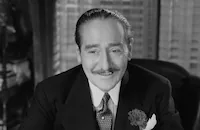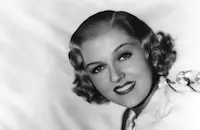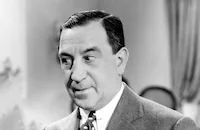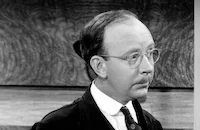Easy to Love

Brief Synopsis
Cast & Crew
William Keighley
Genevieve Tobin
Adolphe Menjou
Mary Astor
Edward Everett Horton
Patricia Ellis
Film Details
Technical Specs

Synopsis
Carol and John Townsend and their friends, Eric Schulte and Charlotte Hopkins, end a social evening by separating into two cars for the drive home. Eric rides with Carol while Charlotte and John ride together. Eric loves Carol despite the fact that she only has eyes for her husband. John, however, is having an affair with Charlotte. Carol begins to suspect this when she learns that John has lied about spending his afternoons on the polo field. She hires a detective, who informs her that John meets Charlotte at a secret apartment. Carol invites Eric to join her for the afternoon, leading him to believe that she will finally give in to his proposals. With Eric in tow, Carol knocks on Charlotte's door, and when she answers, pretends to have knocked by mistake. Eric is surprised to see Charlotte in a strange apartment and while she tries to explain, Carol confesses her "affair" with Eric in a loud voice so that John will be able to overhear her from his hiding place in the closet. John is furious and, as soon as Carol and Eric leave, rushes home. Carol and John quarrel over Charlotte and decide to divorce, to the distress of their daughter Janet, who plans a marriage of her own to Paul Smith. Infuriated by what she sees as childish behavior, Janet announces that after having seen her parents' marriage fail, she and Paul will live together without benefit of clergy. As soon as Janet and Paul leave the house, Carol and John follow them to a hotel. Paul and Janet agree to open the door to their room only if Carol and John forgive each other and reunite. When they agree, Janet announces that she and Paul were married in the morning.

Director

William Keighley
Cast

Genevieve Tobin

Adolphe Menjou

Mary Astor

Edward Everett Horton

Patricia Ellis

Guy Kibbee

Hugh Herbert
Paul Kaye

Hobart Cavanaugh
Robert Greig
Harold Waldridge
Crew

Film Details
Technical Specs

Articles
Easy to Love 1934 - Easy to Love
Adolphe Menjou and Genevieve Tobin star as John and Carol, a seemingly happily married couple who spend their evenings in the company of Charlotte (an elegant Mary Astor), a beautiful artist, and Eric (the eternally hapless Edward Everett Horton), a fussy industry kingpin known as "the sardine king." It's quite a quartet: John loves Charlotte, Charlotte loves John, and Eric loves Carol. It would all be quite neat except that while John and Charlotte carry on a passionate and well-ordered affair, Carol still loves John and, after putting a private detective on the case, she makes her plan to win him back by fighting romantic fire with fire.
"The basic principle of good screen fare is the same as the basic principle of the solar system," according to the film's director William Keighley. "No matter what kind of stars you're dealing with, you must observe the natural law of attraction and repellence." In other words, casting is key.
Adolphe Menjou was one of Hollywood's reigning screen sophisticates. He made a career in the silent era playing dapper, debonair society men (he was voted the Best Dressed Man in America nine times) before he shifted into silver-tongued shysters and elegant schemers for sound films. Easy to Love called on both his suave manner and his rat-a-tat banter for the comic complications of the tangled affairs. With her husky voice and worldly confidence, Mary Astor makes a fine match as his refined mistress, playing the high society wit in public and the possessive lover in private.
Top billing went to Broadway star Genevieve Tobin, who came west with the coming of sound and played in support of such stars as Cary Grant, Barbara Stanwyck, Claudette Colbert, Bette Davis and James Stewart over her short screen career. Easy to Love gave her a rare leading role and she made the most of it, using her sparkling laugh and physical grace to dance around her husband and her romantic rival. The film's title proved true in her case: director William Keighley fell in love with his leading lady and they married a few years later.
William Keighley made his solo directing debut with Easy to Love, after co-directing The Match King (1932) and Ladies They Talk About (1933) with Howard Bretherton. He came to Hollywood from the stage, both performing and directing on Broadway and in various touring companies. Adapting a stage play made for a good fit for the director, who applied the energy and pace that defined the street-smart Warner pictures of the early thirties to this drawing room comedy. "Motion picture means 'move.' And if you don't move, the audience movies out on you." He went on to become a reliable hand for Warner Bros., directing studio star James Cagney in crime pictures (G-Men [1935], Bullets or Ballots [1936]) and war films (The Fighting 69th [1940], Captain of the Clouds [1942]) and Errol Flynn in swashbucklers (The Prince and the Pauper [1937], The Master of Ballantre [1953]) among his assignments.
Released in early 1934, Easy to Love snuck in to theaters just before the production code was imposed, which allowed the production to get away with behavior and saucy suggestions that would be forbidden just months later. While some scenes are quite blatant about the affair, other references are worked through playful metaphors. After John explains to his wife that his recent fatigue is due to his passion for playing polo, his butler gives him a knowing look and the loaded line: "Polo can be a little strenuous, particularly if you do it every afternoon." It makes for a winning melding of sensibilities: the glamour, sophistication, and sex of the Lubitsch-style comedy with the snap and banter of the Warner style.
By Sean Axmaker Sources:
A Life on Film, Mary Astor. Delacorte Press, 1967.
The Warner Brothers Story, Clive Hirschhorn. Crown Publishers, 1979.
Warner Brothers Directors, William R. Meyer. Arlington House, 1978.
"Easy to Love" review, A.D.S. New York Times, January 15, 1934.
IMDb

Easy to Love 1934 - Easy to Love
Quotes
Trivia
Notes
According to Motion Picture Herald, this was William Keighley's first solo directorial assignment. He previously co-directed with Howard Bretherton The Match King and Ladies They Talk About (see below).















